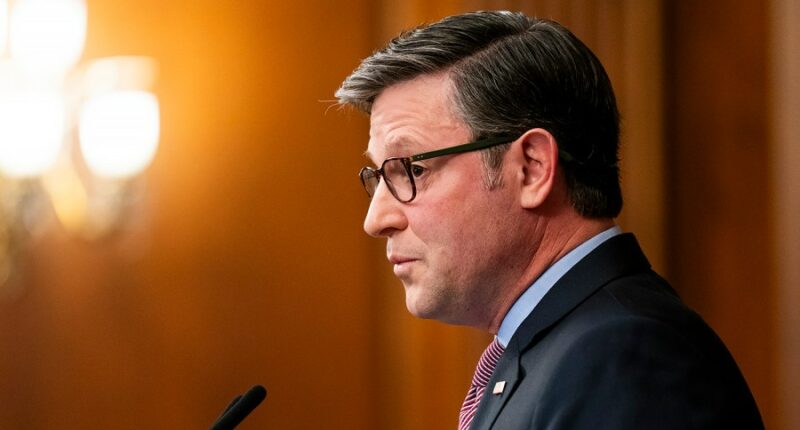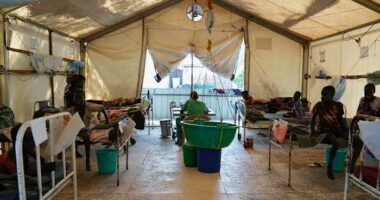Share this @internewscast.com

House Republicans are increasingly uneasy about the time lost after Speaker Mike Johnson’s (R-La.) decision to keep the House inactive for over a month amidst the government shutdown. As the funding standoff looms, leadership is preparing members for extended sessions once the deadlock is resolved.
Tensions over the House’s inactivity came to the forefront during a GOP conference call on Tuesday. Representative Marjorie Taylor Greene (R-Ga.), who has previously criticized the recess strategy, once again challenged Johnson on his approach to managing the shutdown.
Concerns were echoed by other members, including Representative Dan Crenshaw (R-Texas). According to a source and reports from Axios, Crenshaw questioned how legislators plan to recover the time lost during this extended recess.
The House hasn’t held a vote since September 19, marking the longest hiatus since a six-week recess before the 2024 election—yet, this break was unscheduled.
In his strategy to exert pressure on Senate Democrats, Johnson canceled five weeks of planned votes. Senate Democrats are pushing for negotiations over expiring enhanced ObamaCare subsidies, while Johnson backs a House-approved, Republican-designed “clean” continuing resolution to fund the government until November 21.
Representative Stephanie Bice (R-Okla.) expressed to reporters that while she appreciates spending additional time in her district and acknowledges ongoing committee work and other duties, she emphasized, “we are all built to work here.”
One House Republican familiar with leadership conversations said that members should brace for a jam-packed schedule when the chamber returns — likening it to “two-a-day” football practices.
“It’s not going to be business as usual. It’s going to be long nights, long days,” the GOP member said.
House Appropriations Committee Chair Tom Cole (R-Okla.) said that he would meet with Johnson on Thursday about all the work left to do on appropriations bills when the shutdown ends. All 12 appropriations bills have cleared committee, but only a few have hit the House floor.
“We’re just going to have to hit the accelerator,” Cole told The Hill in an interview on Thursday, adding that he would meet with the Speaker on appropriations later in the afternoon.
Cole said that there hasn’t been much negotiation with Democrats on the details of spending bills during the shutdown, accusing Democratic leaders of keeping their members from working on spending bills in earnest during the shutdown. For that reason, he did not think that being in session during the shutdown would have made a difference in how much work the Appropriations Committee will have to do when it ends, unlike other committees.
But Cole is seeking more guidance from leadership in both parties and chambers on sequencing for those bills and whether appropriations or party leaders would negotiate the topline.
“We’ve got to move and we’re wasting a lot of time,” Cole said.
While the Speaker insists that keeping the House out is not a “strategy” and argues that there is nothing else for the House to be working on while the government is shut down, members and staff privately say there is plenty of work that could be done inside the building.
Some members lament that leaders have not only blocked floor votes, but kept committees from holding hearings and markups during the shutdown.
But they also acknowledge that Johnson’s move to keep members from voting also avoids the headache of having vocal, attention-seeking members distract from the shutdown message — and also discourages more moderate members working without the blessing of leadership to strike a deal with Democrats on the health care subsidy issue.
And by declining to swear in Rep.-elect Adelita Grijalva (D-Ariz.) while the House is out of session, Johnson also avoids the problem of a discharge petition getting enough signatures to force a vote on releasing the “Epstein Files” — though he contends the swearing-in delay has nothing to do with the petition.
Johnson, while lamenting that the weekly House GOP conference calls are routinely leaked to reporters, said in a press conference on Wednesday that there are only about “three to four members of the House Republican Conference who have only mildly questioned working in the districts as opposed to being here on the floor.”
“I can tell you that 99 percent of all the Republicans in the Senate and the House heartily agree with what we are doing,” Johnson said.
Johnson has pointed to work being done by the committees amid the shutdown, such as the House Oversight and Government Reform Committee releasing more transcripts and documents from its investigation into the late sex offender Jeffrey Epstein. He noted that the House Energy and Commerce Committee, on a bipartisan basis, also requested a briefing from NBA Commissioner to Adam Silver on the basketball league’s players and coaches being indicted on charges relating to sports fixing and illegal gambling.
Consensus is also growing that the Nov. 21 stopgap end-date will have to be pushed back once lawmakers find a resolution to the government shutdown, with the Republican familiar with leadership discussions saying end of January or early February looks most likely.
Some members of the House Freedom Caucus and beyond have floated another long-term continuing resolution extending through the end of the fiscal year, or even December 2026.
Cole said he is “adamantly opposed” to that kind of long-term CR, but that an end-of-January CR “sounds reasonable to me.”
He added that the bipartisan Appropriations Committee leaders believe “once we’re allowed to negotiate, we can get these bills done. We’ve done it before.”
“If there’s any silver lining in this, they’ll probably be even more of a sense of urgency to get stuff done,” Cole said.









